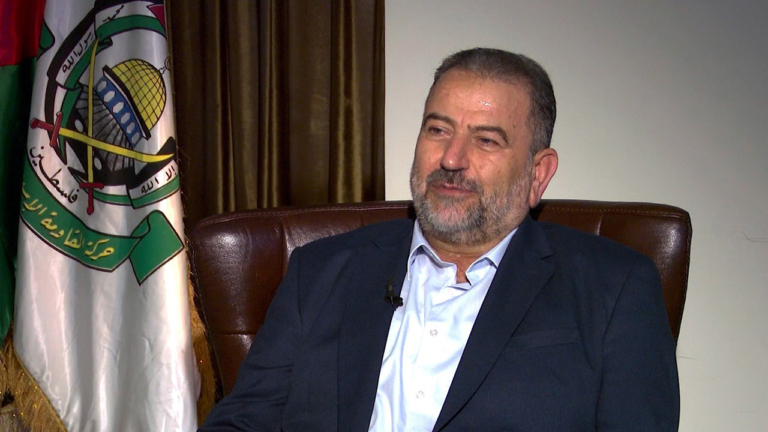
In its pursuit of Hamas leaders, an Israeli drone has assassinated Saleh al-Arouri, the Deputy Chairman of Hamas’s Political Bureau, a senior official in the organization’s external leadership cadre, and a co-founder of al-Qassam Brigades that has been engaged since October 7 in open warfare with Israel in the Gaza Strip. This assassination is part of Israel’s publicly declared war plan against Hamas—Israeli leaders have vowed to prosecute their war against its leaders wherever they are after the Gaza operation ends—but marks a serious escalation in the conflict, especially that it took place in southern Beirut, one of Hezbollah’s main areas of operation in Lebanon.
In addition to realizing one of its war aims—eliminating Hamas officials—Israel sends many messages in a number of directions. First, the timing of the assassination is a clear attempt at boosting the morale of the Israeli army that has failed thus far in ending the resistance to its October 27 ground offensive against the Gaza Strip. The entire strip remains a hot war zone despite almost three months of relentless bombardment and outright slaughter of more than 22,000 Gazans, in addition to unknown numbers of missing under the rubble. The Israeli army is showing signs of fatigue and has just announced that it is withdrawing five brigades from the Gaza front. While part of the justification is to get the troops ready for a potential conflagration with Hezbollah in the north, the reality remains that pulling out troops from an active war zone indicates that a decision has been made that said war may be too costly and not be winnable, in the short term or ever.
Second, targeting and killing Arouri in Hezbollah’s backyard is a clear message that Israel can reach anyone any time its strategy dictates such a course of action. Arouri was reportedly in a meeting with other militants and died with at least five of them. Not that they have not been taking precautions against Israel’s assassination threats, but other Hamas leaders will be even more vigilant in the future. This will also be the case with Hezbollah leaders whose comrades have been targets before. Hezbollah General Secretary Hassan Nasrallah could himself have been a target for assassination in the northeastern city of Baalbek a few days ago when he reportedly appeared at a funeral for his former administrative assistant. On December 25, Israel also killed Seyyed Razi Mousawi in Damascus, who was a senior commander in Iran’s Islamic Revolutionary Guards Corps and liaison between Iran and Syria.
Third, the location of the assassination in Beirut is far from the Lebanese-Israeli border, and thus outside the area that has witnessed Israeli and Hezbollah attacks, especially since October 7. It thus may be considered as falling outside the rules of engagement tacitly agreed to by both parties. Moreover, it challenges Hezbollah’s Nasrallah’s declaration that any Israeli attack on anyone in Lebanon (Lebanese, Palestinian, Syrian, Iranian, or other), will generate a serious reaction from the party. Nasrallah’s reaction and decision might be announced in a speech on January 3 on the anniversary of the American assassination of Iranian Quds Force Commander General Qassem Soleimani in January 2020. At any rate, and as the tit-for-tat skirmishes continue between Hezbollah and Israel, it is hard to imagine that Nasrallah will finally decide to expand attacks on Israel and threaten the start of a regional war. What is likely is that Hezbollah will increase the frequency and intensity of its attacks on Israel to at least show solidarity with its ally Hamas. On the other hand, it is not clear either that Israeli Prime Minister Benjamin Netanyahu is anxious to start said confrontation at the present time, considering the hard time Israel is having in Gaza.
But while Israel pursues its war aims against Hamas and its allies in the region, it is important to ask whether the United States is in full agreement and supports the killing in Beirut or may have been kept out of the decision to kill Arouri by Netanyahu and his war cabinet. The likely answer is that Washington is not sad that a Hamas leader has been eliminated, just as it has not shed many tears over the massacre of Palestinians in Gaza. After all, the US Treasury Department designated Arouri in 2015 as a Specially Designated Global Terrorist and offered $5 million for information on him.
But striking any targets inside Beirut specifically contradicts American policy of trying to spare Lebanon the detrimental impacts of a region-wide war and to limit Israel’s escalation on its northern front. Thus it becomes legitimate to inquire, first, if the United States is really interested in sparing Lebanon whatever calamities that might befall it in the post-Arouri period or, second, if it has any political will to curb Israel’s penchant for igniting regional confrontations that ultimately hurt American interests in the Middle East?
Finally, it is important to state that while Arouri’s killing may provide a much-needed psychological boost to the Israeli military, it does not ease Israel’s challenge in eliminating Hamas or forcing it to surrender. Previous Israeli assassinations of Hamas leaders, such as those of founder Ahmad Yassin and successor Abdel-Aziz al-Rantisi, only produced other leaders dedicated to the organization’s agenda of fighting Israel for Palestinian liberation. Indeed, Palestinian society is full of leaders from all walks of life who are dedicated to the goals of liberation and independence. Israel may continue to kill those who rise to prominence, but its aim of killing the Palestinian right to resisting occupation and establishing an independent state will remain impossible to achieve.
The views expressed in this publication are the author’s own and do not necessarily reflect the position of Arab Center Washington DC, its staff, or its Board of Directors.
Featured image credit: Almayadeen

